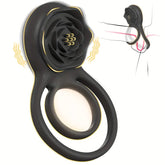What is the Sex Drive?
Sex drive, or libido, is a fundamental aspect of human biology and psychology, influencing personal relationships and overall well-being. Understanding what drives sexual desire and how it can vary throughout life is crucial for both health and happiness.
What Is Sex Drive Exactly?
Sex drive refers to one's overall sexual desire or urge for sexual activity. It is influenced by a complex interplay of biological, psychological, and social factors. Biologically, it's primarily driven by hormones and brain chemistry, particularly involving testosterone and estrogen, which play key roles in regulating libido.

What Factors Influence Your Sex Drive?
Sex drive, or libido, is influenced by a complex interplay of biological, psychological, and social factors. Understanding these influences can help individuals manage or improve their sexual health. Here are some of the key factors that can affect your sex drive:
Hormonal Balance: Hormones play a crucial role in regulating sexual desire. Testosterone and estrogen are particularly significant, with testosterone generally associated with higher libido in both men and women. Changes in hormonal levels due to aging, health conditions, or medications can significantly impact libido.
Mental Health: Psychological well-being is deeply connected to sexual desire. Stress, anxiety, and depression can all lead to a decrease in libido. Mental health issues can dampen your energy levels, reduce your interest in sexual activity, and even affect your body's physical responses.
Physical Health: Your overall physical condition can affect your libido. Chronic illnesses such as diabetes, heart disease, and other medical conditions can impair blood circulation, reduce energy levels, and decrease sexual desire. Additionally, fatigue, whether due to lifestyle or illness, can also significantly impact sex drive.
Medications: Certain medications can have side effects that decrease libido. For example, antidepressants, blood pressure medications, and even some contraceptives can lower sexual desire. If you suspect your medication is affecting your sex drive, discuss alternatives with your healthcare provider.
Relationship Dynamics: The quality of your relationships plays an essential role in sexual desire. Emotional closeness and healthy communication with a partner can increase libido, while conflict, dissatisfaction, and poor communication can reduce it.
Lifestyle Choices: Lifestyle factors such as alcohol consumption, smoking, and drug use can negatively affect libido. Additionally, a sedentary lifestyle and poor diet can decrease energy levels and reduce sexual desire, while regular exercise and a balanced diet can enhance it.
Sleep Quality: Adequate sleep is crucial for maintaining good health and a healthy libido. Sleep disorders and lack of sleep can lead to fatigue and reduced sex drive. Ensuring a regular sleep schedule and addressing any sleep-related issues can improve libido.
Self-Esteem and Body Image: How you perceive yourself can also affect your libido. Low self-esteem or a negative body image can make you feel less desirable, which can decrease your interest in sex. Working on self-acceptance and confidence can improve sexual desire.
By understanding these factors, individuals can take steps to enhance their libido through lifestyle changes, counseling, or medical treatment, leading to improved well-being and relationships.
How Does Age Affect Sex Drive?
Libido naturally changes with age. Young adults often experience a peak in sex drive, which can decline with hormonal changes as they age. Men might notice decreased libido with decreased testosterone production, while women may see changes during menopause. However, aging doesn't equate to lost libido, and many individuals enjoy active sex lives well into later years.

What Are Common Myths About Sex Drive?
Misconceptions about sex drive can create unnecessary stress and unrealistic expectations. Here are five important and common myths about libido, debunked to provide a clearer understanding:
Myth 1: Men Always Want More Sex Than Women
This widespread stereotype suggests that men have higher sex drives than women. In reality, sexual desire varies significantly among individuals, regardless of gender. Women can have just as high, if not higher, libido as men.
Myth 2: Older Adults Don’t Have Sex Drives
Many believe that as people age, their sex drive inevitably diminishes to the point of non-existence. While it's true that hormonal changes can affect libido, many older adults continue to enjoy an active and fulfilling sex life well into their later years.
Myth 3: Sex Drive Should Be Constant
The notion that one’s libido should remain consistent throughout life is false. Sex drive naturally fluctuates due to various factors such as health, stress levels, relationship dynamics, and life changes. It's normal for libido to ebb and flow.
Myth 4: If You Don’t Desire Sex, There’s Something Wrong With You
Lack of sexual desire is often incorrectly viewed as a dysfunction or a medical problem. While it can be associated with health issues, it’s also normal for some individuals to naturally have a lower libido without any underlying problems.
Myth 5: You Need Sex to Be Happy
This myth suggests that sexual activity is essential for happiness and fulfillment. While sex can be a significant source of pleasure and emotional connection for many, happiness and fulfillment can be achieved in a variety of ways, with or without active sexual relationships.
Dispelling these myths is crucial for developing a healthier understanding of sex drive and its impact on individual and relationship well-being. This allows for more realistic expectations and can lead to improved sexual health and satisfaction.
What Steps Can You Take to Maintain a Healthy Sexual Lifestyle?
Maintaining a healthy sexual lifestyle is essential for overall well-being and relationship satisfaction. Here are five practical steps you can take:
-
Prioritize Communication: Foster open and honest dialogue with your partner about sexual desires, preferences, and any concerns. This transparency builds trust and intimacy, which are fundamental for a fulfilling sexual relationship.
-
Manage Stress Effectively: High-stress levels can negatively impact your libido. Incorporate relaxation techniques such as deep breathing, yoga, or regular exercise into your routine to manage stress and enhance your mental and physical readiness for sexual activity.
-
Maintain Physical Health: Regular physical activity improves circulation and increases endurance, which are beneficial for sexual health. Combine this with a balanced diet rich in vital nutrients to boost energy levels and libido.
-
Ensure Adequate Sleep: Sleep is crucial for balancing hormones that affect libido. Aim for 7-9 hours of quality sleep per night to keep your energy and mood optimized for sexual activity.
-
Keep Things Exciting: Introduce variety and novelty into your sexual routine to prevent boredom and enhance desire. Experiment with new positions, romantic settings, or playful scenarios to keep the sexual aspect of your relationship vibrant and engaging.
Implementing these steps can help you sustain a healthy and enjoyable sex life, contributing to greater happiness and stronger relationships.
Conclusion
Understanding and maintaining sex drive involves acknowledging its complexities and influences. By addressing the factors that affect libido and dispelling common myths, individuals can enjoy a healthier and more fulfilling sexual lifestyle. Whether through lifestyle adjustments, medical intervention, or improving communication with partners, proactive steps can significantly enhance one's sexual well-being.
To further enhance your sexual experience, consider exploring new and innovative products like the 2024 rose sex toy from Westar. This sophisticated rose sex toy offers a unique and exciting way to explore pleasure, making it a perfect addition to your intimate moments. Learn more and discover the possibilities by visiting Westar's official website.
Related reading



